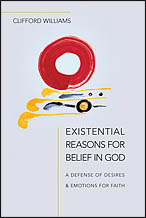Clifford Williams is professor of philosophy at Trinity International University‘s Trinity College and serves as chair of the philosophy department. His areas of expertise within the field of philosophy include free will and determinism, religious dividedness, philosophy of time, and philosophy of love and friendship. Williams’ recent books include Existential Reasons for Belief in God: A Defense of Desires & Emotions for Faith (2011), The Divided Soul: A Kierkegaardian Exploration (2009), The Wisdom of Kierkegaard: A Collection of Quotations on Faith and Life (2009), For more information, visit his website or view his online vita.
Book Basics
Existential Reasons for Belief in God provides a compelling case for the role of needs, desires and emotions in belief. Williams offers well-reasoned explanations alongside illustrations from the life of individual believers that create a text which is accessible to the curious newcomer yet helpful to the seasoned academic. After introducing his list of existential needs, which he further divides into self-directed and other-directed, Williams presents the existential case for belief in God and addresses the four logical objections. His conclusion begins with these words:
Need by itself does not justify believing in God. However, when need is supplemented with reason in some way, then need does  legitimately draw us to faith in God. This drawing leads to the following three claims: we should let ourselves be drawn to faith by need, we often do not, and part of what makes life so spectacular are the emotions we have when we satisfy our existential needs with faith in God (p. 175).
legitimately draw us to faith in God. This drawing leads to the following three claims: we should let ourselves be drawn to faith by need, we often do not, and part of what makes life so spectacular are the emotions we have when we satisfy our existential needs with faith in God (p. 175).
So What?
The modern quest for knowledge was dominated by the idea that the rational and objective pursuit was best in all disciplines, including theology. Building heavily upon Kierkegaard, Pascal and Unamuno, Williams offers a way forward that is far better suited for postmodernity with an acknowledgement that religious belief is far richer than objective intellectual ascent.
In what ways has your personal experience taught you that empirical quest alone is inadequate for developing religious belief? How might postmodernity create an environment wherein a more holistic approach is considered normative?
Clifford Williams. Existential Reasons for Belief in God: A Defense of Desires & Emotions for Faith. InterVarsity Press, 2011. ISBN: 9780830838998.
